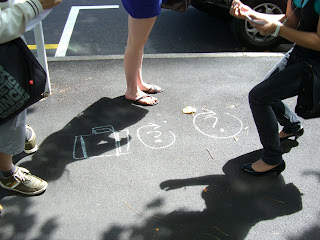
For our third orientation week exercise we "explore(d) conventions by following simple instructions and observing how the conventions of the systems interface with an environment."
We were divided into groups of four and each given a role within the group. The Actuator was the subject of the work and was the one to perform all actions and tasks, the Controller reads the instructions and directs the Actuator, the Tracker charts the progress by mapping the actions completed and drawing the appropriate icon on the pavement when an action was initiated, lastly the sensor documents the entire group through the whole process.
As the actuator for my group my day included being directed around town and completing various exercises such as following a 'lady in red' and recording a conversation. I had no say in what my tasks were and only a little in how I carried them out; it was quite a liberating position to be in to be told what to do, although I felt it did raise ethical questions in how I wanted to fulfil tasks.
When reviewing the exercise I realised we were working as a system or a machine of sorts, by giving each member of the group a task all of their own we were performing an imperfect and very human simulation to help us see how different parts interact to create a working system. This exercise taught us to work together on a human level or to interact in a more metaphorical sense as a system. It helped us explore the nature of systems and made for an interesting day performing the exercises then experimenting with the best ways of documenting and presenting the process to a large group of people, in a way that made it different from a number of similar projects. We went with a power point presentation that showcased our map, photographs and movies, this was an easy to follow format but lacked a bit of excitement which I will reconsider next time. All up an interesting exercise to get us thinking about systems and putting ourselves in the head space of various parts and get us thinking both practically and creatively.

No comments:
Post a Comment